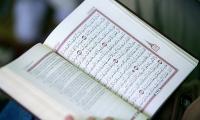The Institute calls for more attention to freedom of religion or belief in the Agenda 2030

Parliamentarians should include freedom of religion or belief in their planning, law-making and budgeting for addressing the UN Sustainable Development Goals. Religious and belief leaders on the other hand should demonstrate that religious values and the values underlying Agenda 2030 are compatible and mutually reinforcing.
This paper is part of "Leaving no one behind" - a series of briefing papers on freedom of religion or belief and the Sustainable Development Goals.
The series includes six papers:
- Freedom of Religion or Belief and the Sustainable Development Goals
- Freedom of Religion or Belief and Health
- Freedom of Religion or Belief and Education
- Freedom of Religion or Belief and Women’s Rights
- Freedom of Religion or Belief and Climate Change
- Freedom of Religion or Belief and Freedom of Expression
The papers will be published and presented at online seminars during fall 2021 and spring 2022.
These are some of the many concrete actions suggested in a new briefing paper produced by the Danish Institute for Human Rights for the Freedom of Religion or Belief Leadership Network. The newly published briefing paper asserts that in the implementation and monitoring of the Agenda 2030, it is essential to pay attention to freedom of religion or belief and the broader discrimination on the grounds of religion or belief.
“If we want to improve the lives and prospects of everyone, ‘leaving no one behind’, we must ensure due attention to those who are subject to discrimination, marginalisation and inequality on the grounds of religion or belief. The ongoing COVID-19 pandemic has made it painfully clear that religious or belief minorities and indigenous peoples are often left behind when it comes to access to health care and quality treatment, but attention to freedom of religion or belief is equally important in relation to many other SDGs, including those concerning education, women’s rights, climate change and access to justice,” says Marie Juul Petersen, the author of the new briefing paper and senior researcher at the Danish Institute for Human Rights.
The briefing paper highlights that a freedom of religion or belief perspective to the Sustainable Development Goals contributes more broadly to building open, pluralist, and inclusive societies. The paper also emphasizes that freedom of religion or belief together with other human rights, can provide effective protection against those forms of inequality and discrimination that are justified with reference to religion or belief.
“This and subsequent briefing papers will provide concrete suggestions for parliamentarians and faith leaders to address inequalities in relation to religion or belief using the SDGs framework. The aim is to bring larger, more international concepts closer to the ground, so that policies and laws are informed by context-based discussions and lived experiences,” says Dr Charles Reed, director of operations at the Freedom of Religion or Belief Leadership Network.
The new briefing paper will be launched at an online high-level dialogue 23 September 2021, where parliamentarians, faith leaders, experts and policy experts will have the opportunity to reflect on the relationship between freedom of religion or belief and the Sustainable Development Goals within their context. Register here.
The dialogue is part of a series of consultations taking place this autumn which will coincide with other briefing papers on freedom of religion or belief and health (SDG 3), inclusive and equitable education (SDG 4), gender equality and empowerment (SDG 5), combatting climate change (SDG 13) and access to justice for all (SDG 16). More information can be found here.
The dialogue is organized by the Freedom of Religion or Belief Leadership Network, International Panel of Parliamentarians for Freedom of Religion or Belief, African Parliamentarians Association for Human Rights, Religions for Peace and UN’s Faith for Rights Initiative.
The Leaving No One Behind series of publications and consultation has been commissioned by FoRBLN, an international consortium funded by the UK Foreign, Commonwealth and Development Office (FCDO).
